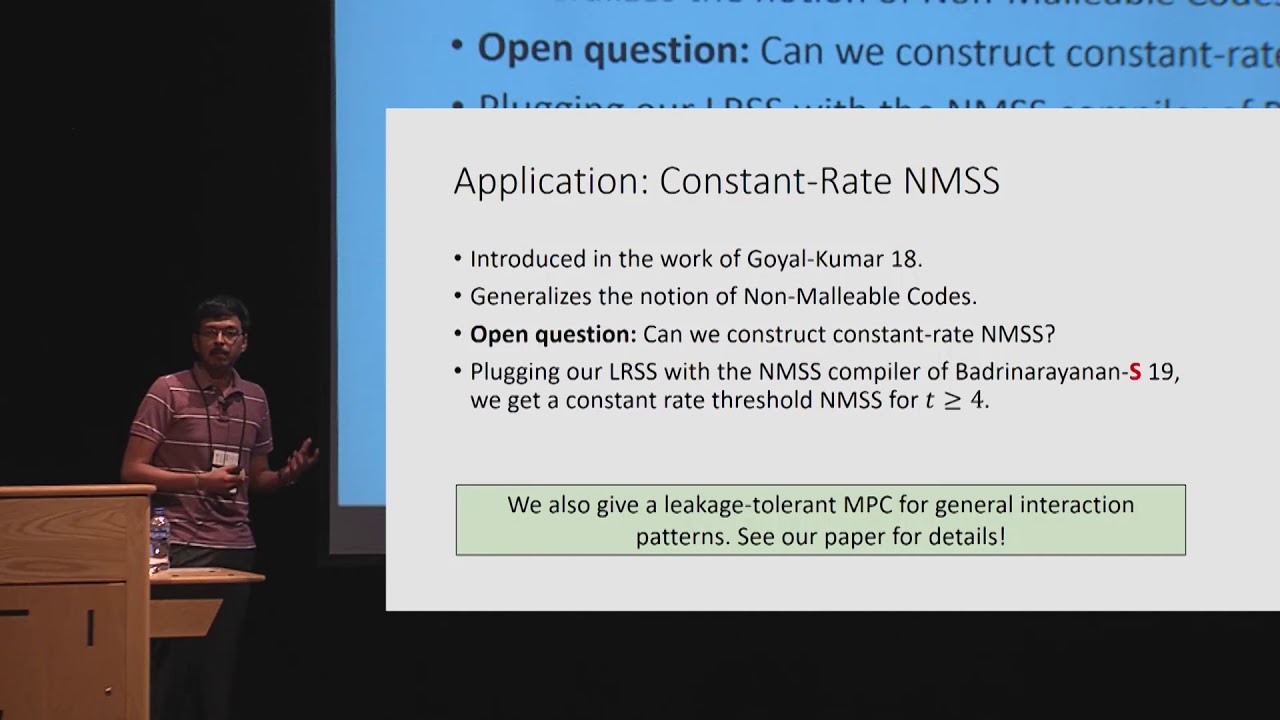Welcome to the resource topic for 2018/1154
Title:
Leakage Resilient Secret Sharing and Applications
Authors: Akshayaram Srinivasan, Prashant Nalini Vasudevan
Abstract:A secret sharing scheme allows a dealer to share a secret among a set of n parties such that any authorized subset of the parties can recover the secret, while any unauthorized subset of the parties learns no information about the secret. A local leakage-resilient secret sharing scheme (introduced in independent works by (Goyal and Kumar, STOC 18) and (Benhamouda, Degwekar, Ishai and Rabin, Crypto 18)) additionally requires the secrecy to hold against every unauthorized set of parties even if they obtain some bounded local leakage from every other share. The leakage is said to be local if it is computed independently for each share. So far, the only known constructions of local leakage resilient secret sharing schemes are for threshold access structures for very low (O(1)) or very high (n -o(\log n)) thresholds. In this work, we give a compiler that takes a secret sharing scheme for any monotone access structure and produces a local leakage resilient secret sharing scheme for the same access structure, with only a constant-factor blow-up in the sizes of the shares. Furthermore, the resultant secret sharing scheme has optimal leakage-resilience rate i.e., the ratio between the leakage tolerated and the size of each share can be made arbitrarily close to 1. Using this secret sharing scheme as the main building block, we obtain the following results: 1. Rate Preserving Non-Malleable Secret Sharing: We give a compiler that takes any secret sharing scheme for a 4-monotone access structure with rate R and converts it into a non-malleable secret sharing scheme for the same access structure with rate \Omega(R). The prior such non-zero rate construction (Badrinarayanan and Srinivasan, 18) only achieves a rate of \Theta(R/{t_{\max}\log^2 n}), where t_{\max} is the maximum size of any minimal set in the access structure. As a special case, for any threshold t \geq 4 and an arbitrary n \geq t, we get the first constant rate construction of t-out-of-n non-malleable secret sharing. 2. Leakage-Tolerant Multiparty Computation for General Interaction Pattern: For any function, we give a reduction from constructing leakage-tolerant secure multi-party computation protocols obeying any interaction pattern to constructing a secure (and not necessarily leakage-tolerant) protocol for a related function obeying the star interaction pattern. This improves upon the result of (Halevi et al., ITCS 2016), who constructed a protocol that is secure in a leak-free environment.
ePrint: https://eprint.iacr.org/2018/1154
Talk: https://www.youtube.com/watch?v=a4DltmqCeiY
See all topics related to this paper.
Feel free to post resources that are related to this paper below.
Example resources include: implementations, explanation materials, talks, slides, links to previous discussions on other websites.
For more information, see the rules for Resource Topics .
